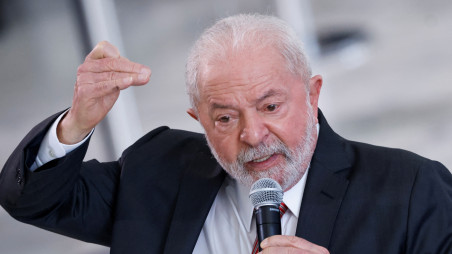'Who decided dollar would be the trade currency?': Brazilian president during China tour
Luiz Inacio Lula da Silva has criticised the outsize role of the US dollar in the world economy and lashed out at the International Monetary Fund

Brazilian President Luiz Inacio Lula da Silva called on BRICS nations to come up with an alternative to replace the US dollar in foreign trade.
"Why can't an institution like the BRICS bank have a currency to finance trade relations between Brazil and China, between Brazil and all the other BRICS countries?" Who decided that the dollar was the (trade) currency after the end of gold parity?" Lula said on Thursday (13 April) kicking off his China visit, reports Bloomberg.
He attended the inauguration of former Brazilian President Dilma Rousseff as head of the multilateral bank set up by Brazil, Russia, India, China and South Africa, collectively known as the BRICS countries.
Luiz Inacio Lula da Silva has criticised the outsize role of the US dollar in the world economy and lashed out at the International Monetary Fund.
The Brazilian president said the bank, headquartered in Shanghai, has great potential "in that it frees emerging countries from submission to traditional financial institutions, which want to govern us."
He said the financial needs of developing nations were enormous, but the lack of reforms had limited credit from existing banks. The BRICS bank could become the "great bank of the Global South," Lula said in a speech.
Lula said the bank could help developing countries depend less on the dollar and finance trade in local currencies.
"We need a currency that gives countries more calm, because today a country needs to run after the dollar to be able to export, when it could export in its own currency," he said.
The leftist president is in China to reset relations with Brazil's largest trade partner after a frosty four years under his far-right predecessor Jair Bolsonaro.
Brazil's Finance Minister Fernando Haddad, who's accompanying Lula in his trip to China, said local currencies are already used in bilateral trade through instruments such as credit receipts. The goal, he added, is to expand mechanisms that allow trade operations to be settled without the intermediation of a third currency.
"The advantage is to avoid the straitjacket imposed by necessarily having trade operations settled in a currency of a country not involved in the transaction," he told reporters in Shanghai.
Beijing has ramped up efforts to boost the use of its own currency in foreign trade.
Last month, Brazil and China took steps to make it easier to settle their foreign trade operations in yuan or reais, with the stated goal of reducing costs by eliminating a third currency from the transactions.



 Keep updated, follow The Business Standard's Google news channel
Keep updated, follow The Business Standard's Google news channel
















